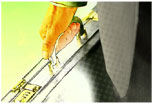Schedule a pre-op appointment with your surgeon at NeoVision Eye Center. In keeping with our efforts to maintain the highest standards of patient safety and in an ongoing effort to avoid possible complications, we ask that each of our pterygium patients undergo an extensive and comprehensive eye exam by an ophthalmologist prior to surgery. During your pre-op visit, your health history will be reviewed, all your questions will be answered, you will be instructed on how to prepare for surgery, you will be given the prescriptions for use after surgery and we will tell you what to expect. If you are on blood thinners, you will be asked to stop them approximately two weeks prior to surgery. You will be asked to sign an informed consent. Full fee for the pterygium surgery is due at the time of your pre-op visit.
 Although most pterygia are harmless and can be left alone safely; they are surgically removed for the following reasons:
Although most pterygia are harmless and can be left alone safely; they are surgically removed for the following reasons:
 The length of surgery depends on several factors including the complexity of each person’s pterygium. Usually, surgery takes about half an hour.
The length of surgery depends on several factors including the complexity of each person’s pterygium. Usually, surgery takes about half an hour. New techniques have significantly reduced healing times. However, each patient’s healing time varies with the type of procedure performed, medical history and physical health. You can expect to go to your work place after a week.
New techniques have significantly reduced healing times. However, each patient’s healing time varies with the type of procedure performed, medical history and physical health. You can expect to go to your work place after a week.
 At
At